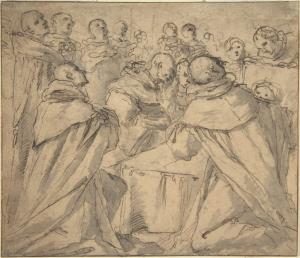
The trouble with ideologies is that they use some element of the truth to mislead people and turn them away from the fullness of the truth. It is the classical problem of heresy. When ideologies are put into action, they highlight some elements of the good at the expense of the fullness of the good, so that what is proper and just is ignored for the sake of that lesser good. People trapped by an ideology will use the limited truth and good contained in their ideology to suggest their ideology represents the absolute truth and good. They will suggest that if anyone rejects their ideology, that means they must reject the good or truth contained within it. That, of course, is not true – one can accept the truths contained in an ideology without accepting the ideology because those truths have their proper place in the fullness of the truth, not in the ideology itself.
Ideologies abuse and misconstrue the truths they possess, so that even those truths become perverted when interpreted by the ideology. What the ideology says about them is false, because the meaning they suggest for those elements of the truth ends up being used to contest the truth itself. Likewise, when the fullness of the good is rejected, whatever good is intended by someone following an ideology will not only be a lessor good, but will produce alongside that lesser good many different evils in relation to what elements of the good have been rejected or suppressed by the ideology.
Abba Alonius, in the Sayings of the Desert Fathers demonstrates this by the way he discusses lying; lying is wrong, it is indeed a sin, but if all our thought and consideration about speech lies only with lying, we will say the wrong thing, and as a result, we will be responsible for what happens as consequence of what we say:
One day Abba Agathon questioned Abba Alonius saying, ‘How can I control my tongue so as to tell no more lies?’ And Abba Alonius said to him, ‘If you do not lie, you prepare many sins for yourself.’ ‘How is that?’ said he. The old man said to him, ‘Suppose two men have committed a murder before your eyes and one of them fled to your cell. The magistrate, seeking him, asks you, “Have you seen the murderer?” If you do not lie, you will deliver that man to death. It is better for you to abandon him unconditionally to God, for he knows all things.’[1]
Certainly, we are not to lie. But that does not mean we have to answer every question given to us. We are not to lie, but we must consider what we say, and the implications of what we say to others, and speak (or not speaking) accordingly. We can be creative in our speech, speaking the truth while not saying what should not be said. We can be silent, and engage that silence creatively, knowing that silence is not a lie.
Abba Alonius, knowing that we should not kill, knowing that Christians should not be involved in the death of another, believed that if telling the truth to some authority will lead to the capture and conviction of some criminal, who would be sentenced to death, it would be better to say nothing and let things work themselves out without our help, than it would be to be the one who revealed where the criminal is. This is not because Alonius thought that such a criminal, such as a murderer, did no wrong, nor that they should suffer no consequences for their actions. Rather, he knew that justice is not had by those who seek such a criminal out so that they can kill them: killing a killer only justifies the killer by suggesting killing can be a morally good act. With that in mind, Alonius points out that those whose actions help lead to the execution of another person would be seen as morally complicit in that death. We would become killers if we become complicit in the killing of someone else. Thus, it is better not to speak than it is to speak and be involved with someone’s death. Alonius chose an extreme circumstance to make his point, not because he defended murder, but rather wanted us to realize the expectations of the good itself. If it is true with a difficult case, than it is also true in other circumstance as well.
The truth of this is not to be found only with the words we speak. It is true in regards all our actions. We can become ideologues, who take some good and use it to ignore the fullness of the good, making us complicit in evil. We can be so concerned with saving the unborn, we are willing to let the world burn. We can be so concerned with going to church, we can spread a deadly virus and have many people suffer cruel, agonizing deaths. We can be so concerned with promoting our own religious liberty, we ignore the obligations such liberty entails. We can be so concerned with making a criminal pay for what they have done, we do not care if the resources used to do so causes more harm to society at large than what they criminal themselves have done. We can be so concerned with our own rights, we think they have no limitations, and so be willing to abuse them as a way to prove we still have them (such would be the case if a person says their freedom of speech must not be repressed, and to fight for that right, they go into a theater and yell fire).
We must never let the partial good become the enemy of the good. We must never allow ourselves to subvert the truth by taking some element of the truth and use it to fight the fullness of the truth itself. We must recognize the holistic nature of the truth, and with it, the holistic expectations of morality. We must consider the full implications of what we say and do. We must be concerned about the consequences of what we say and do, and not excuse what happens by saying “we were just following the dictates of the truth.” If we were not following the fullness of the truth, and all it expects of us, we were not following the truth, but our own wants and desires as they pervert the truth. Abba Alonius gave us the extreme example in his saying to remind us that we have a responsibility to protect all human life, even those of murderers, so that we can realize the implications of this wisdom and apply it in our activities.
It is right to want a criminal to be properly dealt with by authorities, but it is also wrong to turn someone in to those authorities if they know the authorities will abuse their power and act contrary to the good; there is value in the police, but if the police act against the greater good, then they have become the enemy of the good and truth themselves and should be seen to no longer have the authority to place demands upon us so long as they abuse their power. If we know the police will abuse or kill someone, if the police will act like judge and executioner, then they lose their authority and the right to question us in order to find those they would like to abuse. Police must not be, cannot be, allowed such power. Police must not be the primary means by which society controls itself. Rather, we need something better. We need more safety nets for people so they do not feel as if the only answer they have in life is to be a criminal. We need more social networks, more help for people in need; using police as the only answer to such needs means that we, as a society, are complicit in what happens, both in the actions which people take making them to be criminals, as well as in the actions the police take after they have become criminals. We are the criminals when we, as a society, do not protect people and their best interests. And the police, then, who should be working for the greater good, become rather, employed for private interests, and in so doing, lose all moral authority. We must change how society works. We must not think the only solution to the evils of society is funding the police. We must fund social safety nets. We must make sure society is properly balanced in justice. We must avoid ideologies which want to take a tough stance on crime, if they are not first willing to take an even greater stand against those disparities in society which result in those crimes. We must stand for the greater good.
[1] The Sayings of the Desert Fathers. trans. Benedicta Ward (Kalamazoo, MI: Cistercian Publications, 1984), 35 [Alonius 4].
Stay in touch! Like A Little Bit of Nothing on Facebook.
If you liked what you read, please consider sharing it with your friends and family!













